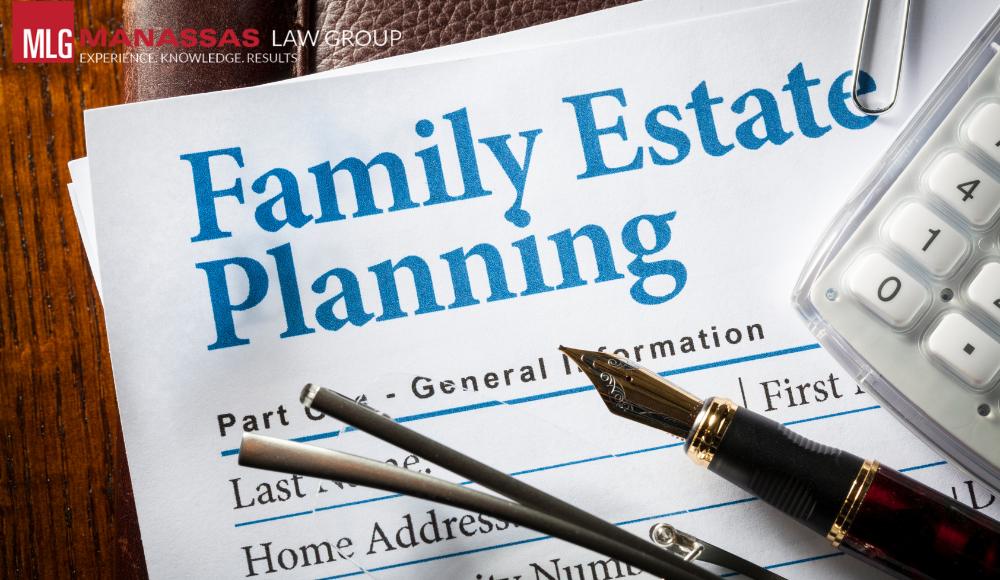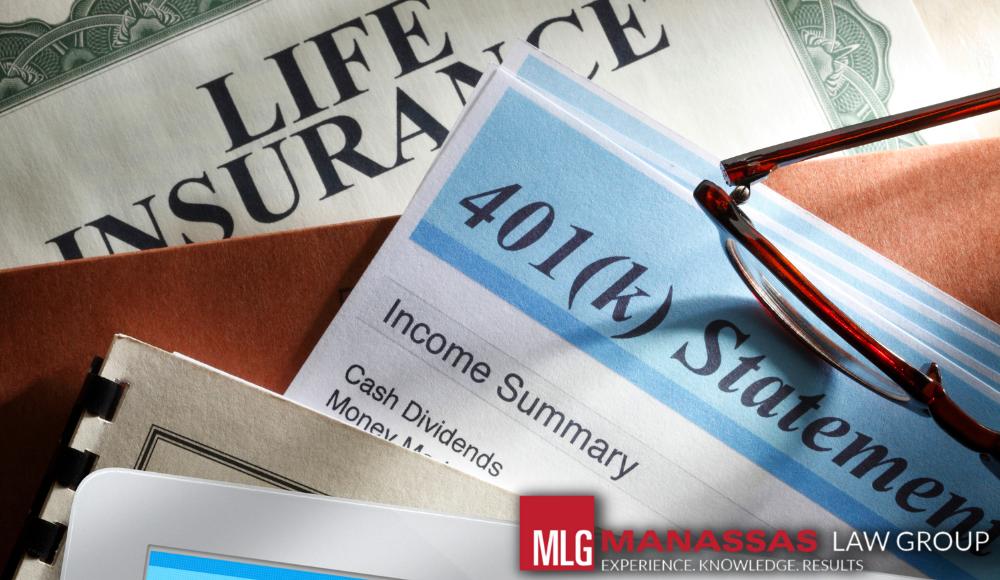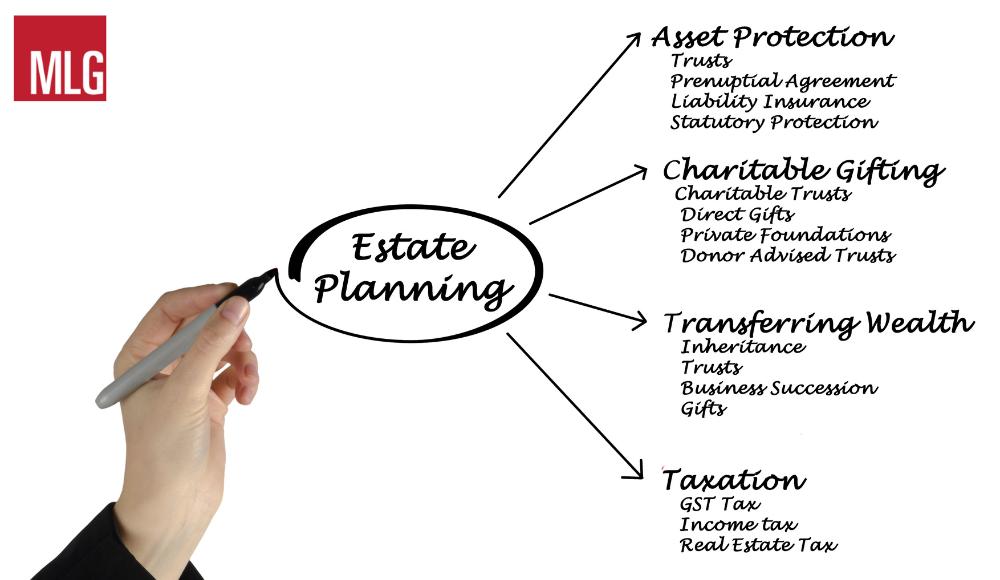Estate Planning
PRACTICE AREAS

Prince William County Estate Planning Lawyer
Helping Clients in Prince William County, VA and Surrounding Areas With the Estate Planning and Probate Process
When a loved one passes away, not only is it a time of mourning–unfortunately, it also involves a lot of shifting of assets as the person’s worldly goods are distributed according to the law and to their wishes. But how does this happen, and what’s the process? How are you supposed to focus on wills, trusts, probate, or taxes when you’ve just lost a loved one? And for people who want to prepare for the future: how do you make it easier for your friends and family?
Well, if you have any of these questions, you’ve come to the right place. That is exactly what an estate planning attorney, like our attorneys at the Manassas Law Group, does. Here, our experienced and competent Prince William County attorneys will guide you through exactly what an estate planning lawyer does, when you need one, and how they can help. For more information on how to prepare for the future in Virginia, give us a call at 703-361-8246 today.

What Does an Estate Planning Lawyer Do?
Your estate simply refers to all of the things you own–cars, houses, land, savings, businesses, etc. When someone passes away, their estate must be divvied up according to the law, and in many cases, according to their own wishes. But the laws on what goes where and who can take what are at times a complex legal issue. For this reason, you need a Prince William County estate planning attorney to guide you through.
Estate planning lawyers work with their clients, as well as occasionally tax professionals and financial advisors, to create a customized plan that fits their client’s estate planning needs, so that at the end of your life, you can be assured that no legal concerns will trouble your family in mourning. Depending on your circumstances, your estate planning attorney may:
- Prepare a will or other estate planning documents
- Identify your beneficiaries
- Create advanced healthcare directives or plans for long-term care
- Help you determine whether you need to establish a trust, and which type of trust would best suit your needs
- Identify ways to avoid the probate process
- Work with a financial advisor to help you reduce estate tax burdens with effective tax planning
- Establishing limited and/or durable power of attorney, or POA
Below, we’ll give you an overview of each of these functions, and how completing them with a Manassas estate planning attorney, can help you ensure your property is protected.
Wills and Trusts
Wills and trusts are similar in that they are both legal entities that decide who will receive your assets. Though they are similar in this regard, a will goes into effect after you die, while a trust goes into effect immediately upon being signed.
A last will and testament can:
- Name guardians for pets and children
- Designate where your assets go
- Appoint an executor
- Specify final arrangements
However, though a will can designate where your assets go, they will most likely still have to undergo probate, which we’ll talk more about below.
A trust is a bit more complicated than a will, but has some added benefits. Funds and other types of assets can be owned by the trust, which is managed by a Grantor. Again, it will go into effect the moment it is signed. A trust can:
- Offer greater control over asset distribution
- Apply to any assets inside the trust
- Come in many different forms and types
A Revocable Living Trust, for instance, can hold assets that can be used to pay for your long-term care–nursing home fees, hospital bills, etc. There is also such a thing as a special needs trust. A special needs trust can hold funds that are to be used for the care of a special needs relative when you or your loved ones are no longer able to provide it.

Probate
Probate is the legal process by which assets that have not otherwise been provided for are transferred after the owner’s death. Probate is only required for assets the deceased person owned alone. Assets held in a trust can avoid probate court because they are owned by the trust. Assets that are owned jointly with another person can usually pass directly to that other person without going through probate court.
If the deceased has assets that must go through probate court, the person named the executor in the will must present themselves and the signed will to the appropriate district circuit court, whether that be Prince William County, Fairfax County, or any other county in Virginia, before a certain date. Under Virginia law, this will be the county where the deceased owned a home at the time of their death, or, if they died in a hospital or nursing home, where they resided before that. The executor then becomes the administrator, or personal representative, during the probate process.
This personal representative or administrator is responsible for determining the value of the estate as well as settling all debts and taxes left by the estate. There is a tax required by probate law determined by the value of the estate, as well as the deceased’s final income taxes, etc.
After debts and taxes are paid and the will is authenticated, the remaining assets can be distributed by the instructions in the will.
Generally, the probate process is a lot of tedious paperwork; the only time a judge needs to be involved is if there is some legal issue or disagreement to be settled. Probate law can be complex and frustrating, especially with a larger estate or a large number of heirs. It is for this reason that many people choose to work with lawyers during their life to avoid the probate process after their death.
If you’re looking for advice on probate practices in Prince William County, give our law firm a call at 703-361-8246. Additionally, the Virginia Bar Association also offers plenty of guides and forms to help you navigate all the paperwork. However, for most estates, having a lawyer search for all the needed paperwork and help you file is best.

Guardianship and Conservatorship
Guardianship and conservatorship are two paths family members can take for an elder or other relative whose estate plan may not have made allowances for every eventuality. For instance, a relative may have made a will and signed a power of attorney that allows someone to make medical decisions for them, but develops dementia and can no longer make financial decisions. A guardianship or a conservatorship can be helpful in this scenario.
Guardianship
To become a guardian, a person must file a petition with the local circuit court. A judge will decide whether the person alleged to be incapacitated is in fact incapacitated. The judge will also decide how broad the Guardian’s authority will be based on the capacity of the person in question.
A Guardian has responsibility for the health, safety, and welfare of the incapacitated person.
Conservatorship
Like a guardianship, a person who wants to obtain a conservatorship must file a petition with the local circuit court. A judge will determine whether the alleged incapacitated person is able to make financial decisions. If the person is judged to truly be incapacitated, the Conservator will be granted the ability to make those decisions for them. This can include investing money, selling property, and paying bills.
The Conservator is required to keep detailed records of their financial dealings on behalf of the incapacitated person.
Tax Planning
Estate tax planning aims to reduce the tax burden on your heirs once you are gone. Without careful planning, much of your estate might be eaten up by estate taxes–a percentage of your estate that Virginia is entitled to before it is passed on to your heirs. There is also a significant Gift tax, meaning if you try and make gifts to your heirs over a certain amount, that amount is subject to taxation.
There are a variety of strategies an attorney can employ in order to preserve your estate from these taxes. With recent reform to the Federal Estate and Gift tax laws, many estates are now free from the burden of tax avoidance planning. However, tax law is complex. Some estates will still be impacted, and proactive planning is required.

Why You Need a VA Estate Planning Attorney
Most people see the need for a criminal defense lawyer or a personal injury attorney when the time comes. But planning for what happens to your assets after your own death can feel morbid and premature. However, the benefits of good estate planning far outweigh the cost.
If you make a watertight plan for all your assets, it will save your loved ones both money and effort after you’re gone. A comprehensive, legally binding plan can eliminate conflict, confusion, and undue emotional stress after your death, leaving your family able to focus on mourning and coping with your loss.
You may think it’s too early to begin estate planning–what if things change between now and your death? Fortunately, by hiring a VA estate planning attorney, you can make timely changes to your estate plan in the case of events like births, marriages, and divorce. If you join a church later in life and decide to leave part of your estate to them, that can also be accounted for.
Additionally, estate planning is not only for the rich. Anyone who has personal belongings, or anyone who has dependents, can and should make an estate plan.

Estate Planning Services in Prince William County, VA
While estate planning is never exactly fun, it has extensive potential benefits for you and for your family. If you want more information on how to create an estate plan in Prince William County, VA, call the law office of the Manassas Law Group at 703-361-8246 to schedule a free consultation today.














